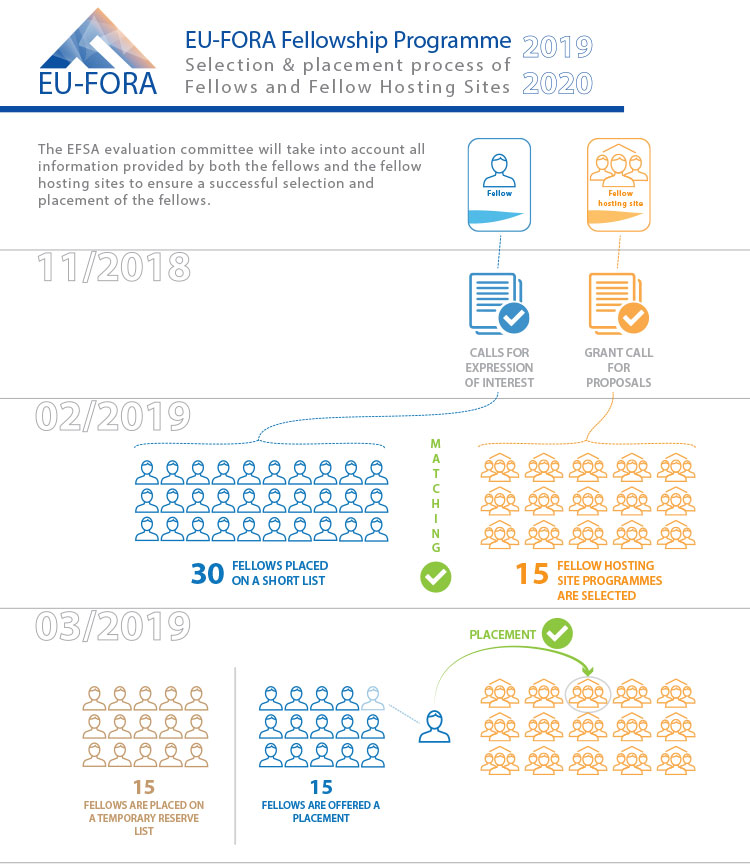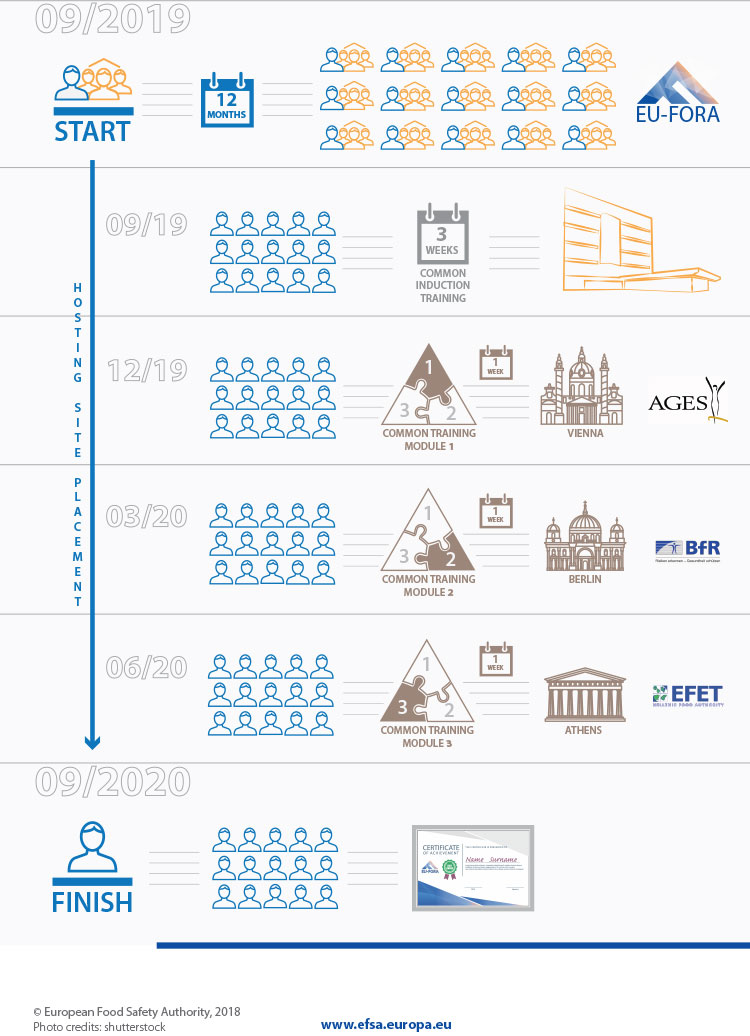The EFSA European Food Risk Assessment Fellowship (EU-FORA) programme at the Italian hosting site Istituto Zooprofilattico Sperimentale dell’Abruzzo e del Molise
“G. Caporale"
Introduction
The European Commission launched a new 10-year economic strategy, called Europe 2020, to boost European economy and promote a smart, sustainable and inclusive growth, based on a greater coordination of national and European economic policy. In this context the European Food Safety Authority (EFSA) plays a vital role in food risk assessment, initiating the European Food Risk Assessment Fellowship (EU-FORA) programme, an ambitious project designed for building capacities of member states in this field. For the second cohort of EU-FORA, Italy has been involved through two hosting sites, one represented by the Istituto Zooprofilattico Sperimentale dell'Abruzzo e del Molise "G. Caporale" (IZSAM).
Teramo is a small city of the Italian region of Abruzzo, located between the highest mountains of the Apennines (Gran Sasso d'Italia) and the Adriatic coast, built from III-II century B.C. The Abruzzo is an important region of Italy, with a glorious history from far past to the contemporary era, famous for its patriotic people including for the Resistance movement during WWII.
The IZSAM has been established in 1941. It plays an essential role in Italy and at the international level in the areas of animal health, veterinary public health, and environmental protection. Having more than 75 years of activity, IZSAM is involved from analytical work and epidemiology surveillance to constant disseminator of know-how in the field of research, training, risk analysis, food safety and animal welfare.
The IZSAM through COVEPI is FAO Reference Centre for Veterinary Epidemiology and OIE Collaborating Centre for Veterinary Training, Epidemiology, Food Safety, and Animal Welfare. Following European Union strategy in building the capacity of the member states food risk assessment, IZSAM was the hosting site in the 2nd year of EU-FORA fellowship programme, the ambitious EFSA programme for strengthening the capacity of the EU in the assurance of food and feed safety.
The EU-FORA training modules and EFSA conference
The EFSA’s European Food Risk Assessment Fellowship programme (EU-FORA) is one of the few programme addressed also to mid-career scientists and it is focused on training them in food risk assessment. Moreover, the course foresees to stimulate the cooperation between food safety agencies, universities and organizations and to contribute to harmonise the food risk assessment practices across Europe.
The programme had two main parts. The first represented by commune intensive training of the fellows and the second by "learning-by-doing" at the hosting sites.
The first part is represented by different trainings including a theoretical induction training of three weeks in Parma at EFSA headquarter, and for this cohort was included the participation at the third Scientific Conference on Science, Food and Society hosted by EFSA in Parma, Italy, on 18-21 September 2018.
Besides the practical work in a specific scientific project, the fellows get theoretical knowledge during different trainings including a theoretical induction training of three weeks in Parma, followed by three weeks of different modules within the one- year period in Vienna, Berlin, Athens:
The topics of the first module held in Vienna were: animal health and welfare, GMO, plant health, nutrition, regulated products, environmental risk assessment).
The objectives of the second module held in Berlin at BfR were: risk communication and crisis response; at the last course held in Athens at EFES was focused on: emerging risks, nanotechnology, risk ranking, adverse outcome pathway –AOP- and mode of action–MoA- and the IATA approach, applications of OMICs in risk assessments.
The "learning-by-doing" programme at IZSAM
For the adequate development of the program, staff of the IZSAM covered all administrative duties in a very proper manner, starting from providing the travelling information, waiting for arrival in the city, accommodation assurance in the guest-house, helping in obtaining all legal registration for temporary residence and fiscal record. Last but not least, the fellow was warmly involved in the team of the working place and community where he could live in a sincere Italian environment.
The second part of the programme, at the hosting site of IZSAM, Teramo, included three subsequent work packages (WP), focussed on the development of risk assessment tools based on molecular typing and WGS of Campylobacter jejuni genome:
- WP1 data organization
- WP2 cluster and association analyses
- WP3 development of risk assessment models.
During the programme, self-preparedness (literature search) and working activity was carried out. The fellow was introduced in the laboratory protocol used in C. jejuni diagnostic, from microbiological (cultivation) and molecular biology (PCR) analysis to genotypical (flaA-SVR, PFGE, MLST, cgMLST) and phenotypical (AMR) characterization. For a better approach, introductory training in bioinformatics, Geographic Information Systems (GIS), statistics and Big data management was fulfilled. For the study was used the raw data from more than 3,000 isolates of Campylobacter spp., collected in entire Italy.
During the risk assessment work, different approaches were tested for source attribution. From the general view, considering the principle of similarities and dissimilarities of cgMLST data, two populations types have been identified, the first clustered named ‘relatively stable’ and the second dispersed (very dissimilar) named "very dynamic".
The AMR phenotypic fingerprint of C. jejuni provides evidence of the common cluster origin of the strains confirmed also by other different clustering methodologies.
The Centro Giovani Kairòs, in Teramo city, offered to the fellow the opportunity to learn the Italian language. Moreover, the fellow was introduce in other social and cultural activities .
Bilateral cooperation
In view of recent epidemics in Europe, taking advantage of this fellowship programme during this period, the foundations have been laid for establishing and strengthening the collaboration between the national reference centres in Italy and Romania, from the IZSAM, Teramo, and the Institute for Diagnosis and Animal Health (IDAH), Bucharest. The first step was to have two days "Animal health riskassessment and vector-borne diseases" workshop during the 2–3 April 2019 for the specialists from IDAH in Bucharest, under scientific coordination of the fellow and participation of the tutors from IZSAM, Paolo Calistri, and Federica Monaco, and from Agricultural Research Council – OnderstepoortVeterinary Research (ARC-OVR), Gert Venter. The second step was the assessment of the needs for professional training in epidemiology for Romanian specialists, for the purpose to find the optimum solution to improve and increase the animal health risk assessment capacity.
Furtheremore, building a cooperation between the IZSAM, the Transylvanian Institute of Neuroscience (TINS) and IDAH in order to develop advanced methodology in risk assement is a priority and the process is in progress.In this context, several fields for collaboration have been designed, like laboratory activity and epidemiology, public health, and risk analysis.Conclusion
The EFSA EU-FORA "learning by doing" programme is among the few from Europe which is also addressed to mid-career scientists and open to those who do not necessarily come from the academic field, being a real fortune for people from East European countries. This was a great opportunity for the fellow to consolidate his specialized knowledge and skills in food safety and veterinary epidemiology and public health, by working in a prestigious international and national reference centre. He gained experience by participating in the dedicated program and other activities within the host organization, better understanding the complex workflow in the specific risk assessment and, at the same time, learned how to investigate an outbreak epidemic, its strengths and weaknesses.
Moreover, this training offered the opportunity to work both independently and in a team, to integrate the multidisciplinary and evidence-based veterinary medicine approach into assessing the risk of Campylobacter and assigning the source in particular.
EFSA’s fellowship initiative contributes to building the EU’s scientific assessment capacity and knowledge community, and it is planned to be further continued. It enhance cooperation among Europe’s food safety agencies and between them and EFSA, thus contributing to the harmonisation of food risk assessment practices across Europe (Figure 1).


Figure 1. EU-FORA Fellowship Programme I Selection & placement process of Fellows and Fellow Hosting Sites
Acknowledgments
This programme was funded by EFSA through EU-FORA programme.
I am extremely grateful to Paolo Calistri (IZSAM), my principal mentor and supervisor, to all the staff of EFSA, Austrian Agency for Health and Food Safety, German Federal Institute for Risk Assessment, Hellenic Food Authority together with all tutors and technical personnel involved in the training. I woulk like to express my sincere gratitude to IZSAM, in particular to the COVEPI (National Reference Centre for Veterinary Epidemiology, Programming, Information and Risk Analysis), the Italian National Reference Laboratory (NRL) for Campylobacter, the GENPAT team, and to the experts Daniela Morelli, Giuliano Garofolo, Adriano Di Pasquale and Annamaria Conte.
In the honor and memories of Armando Giovannini, my second mentor and supervisor.
References
-
Istituto Zooprofilattico Sperimentale dell’ Abruzzo e del Molise “G. Caporale”, Teramo, Italy, Ardelean A.I., Calistri P., Giovannini A., Garofolo G., Di Pasquale A., Conte A. and Morelli D., 2019. Development of food safety risk assessment tools based on molecular typing and WGS of Campylobacter jejuni genome. EFSA Journal 2019;17(S2):e170903, 18 pp.
Adrian Ioan Ardelean
EFSA EU-FORA I Fellow all’IZSAM Direzione sanitaria veterinaria e di sicurezza alimentare I Cluj I Romania